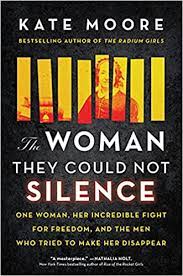Our book for June and July will be The Woman They Could Not Silence: The Shocking Story of a Woman Who Dared to Fight Back by Kate Moore, in paperback. Several copies are available at the Bennington Bookshop.
For our June meeting we will read: the Prologue and parts one, two, and three. For the July meeting we will read: Parts four, five, six and the Epilogue.
Our regular meetings are at 12:00noon on the third Wednesday of the month at the Martha Canfield Library in Arlington – June 15, July 20. Bring your lunch if you wish. Look forward to seeing regulars and welcoming newcomers!

One day in the summer of 1860, an Illinois woman named Elizabeth Packard watched as an ax crashed through her bedroom window.
A wife and mother, her life had previously been relatively quiet, centered on home and church. But she and her husband Theophilius, a preacher, had begun having theological arguments. Disturbed by these, and the idea that Elizabeth was “becoming insane on the subject of women’s rights,” as he later wrote, Theophilius decided to have his wife committed to an asylum. Hence the group of men climbing through the broken window, and carrying her, immobile, to the train that would take her on to the Jacksonville Insane Asylum.
Incarcerated in the asylum for three years, she would go on to write bestselling books chronicling her experience and would campaign successfully against laws that allowed husbands to lock up their wives without trial. Kate Moore’s The Woman They Could Not Silence: One Woman, Her Incredible Fight for Freedom, and the Men Who Tried to Make Her Disappear is the story of Packard’s fascinating lifelong fight.
In an author’s note, Moore writes that she wanted to look at the ways that women have been dismissed as “crazy” throughout history. But most of the stories she read were painfully bleak. “‘Crazy’ was a cul-de-sac, a one-way street that only ever ended with one outcome,” she writes. One Illinois woman she read about was lobotomized in 1955 without any diagnosis aside from being “unfriendly” and “disagreeable.” But in Packard, Moore found an ideal hero, one with a “spirit as wide as her skirt” who not only fought the system but won.
